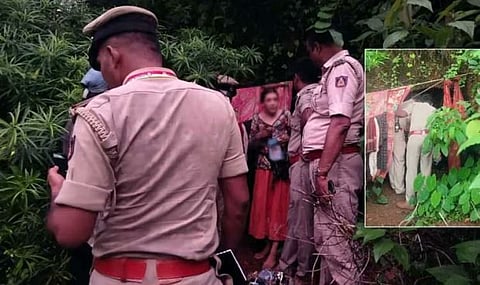
- Home
- NewsGram USA
- India
- न्यूजग्राम
- World
- Politics
- Opinion
- Entertainment
- On Ground
- Culture
- Lifestyle
- Economy
- Sports
- Sp. Coverage
- Misc.
- NewsGram Exclusive
- Jobs / Internships
- Interview

A 40-year-old Russian woman, Nina Kutina, and her two daughters Preya and Ama, aged six and four, were found living inside a cave in the Ramateertha Hills of Gokarna, Uttara Kannada district. Police discovered them during a routine patrol meant to keep adventure seekers away from dangerous areas.
Officers spotted footprints and plastic sheets at the cave’s entrance, along with pictures of gods. They first saw one child playing outside while Kutina was inside the cave with her other daughter.
Sub Inspector Sridhar S R said that the police persuaded Kutina to leave the area by warning her about possible landslides. When they expressed concern about snakes in the forest, Kutina calmly replied that "the snakes are our friends" and would not harm them unless provoked. She said the reptiles often moved near them while bathing at nearby waterfalls but never showed aggression.
Kutina had been living in that cave for two months, but had stayed in different forest areas for nearly eight years. She first came to India in 2016 on a business visa to explore opportunities in tourism and restaurants in Goa and Gokarna. Her visa expired in April17, 2017. After making a brief visit to Nepal in 2018, she returned soon after and began living secretly in the forests of Karnataka to avoid being caught.
The family used minimal clothing during rainy seasons and rarely used artificial light, even though they had candles. They preferred daylight to see. Kutina had a mobile phone, which she only used occasionally, charging it during grocery trips to town. Kutina avoided hotels, lived simply, meditated, and performed religious rituals during her time in the forest.
Police said the children seemed healthy, and Sridhar noted that in 18 years of service, he had never seen a woman raise young children in such conditions. Kutina later sent a message in Russian saying she felt heartbroken about leaving the forest. "Our cave life is over. Our cozy comfortable house was broken. And we were placed in a prison without sky, without grass, without a waterfall, with an icy hard floor on which we now sleep to ‘protect us from rain and snakes", said Kutina. [Rh/Eth/VS]
